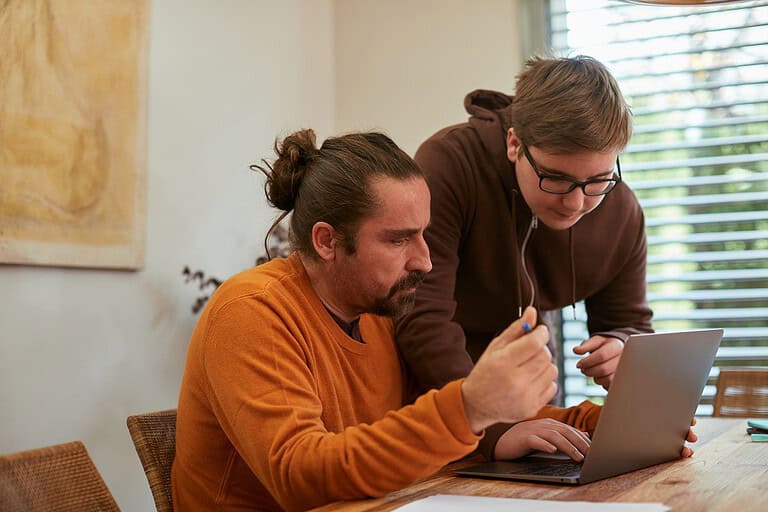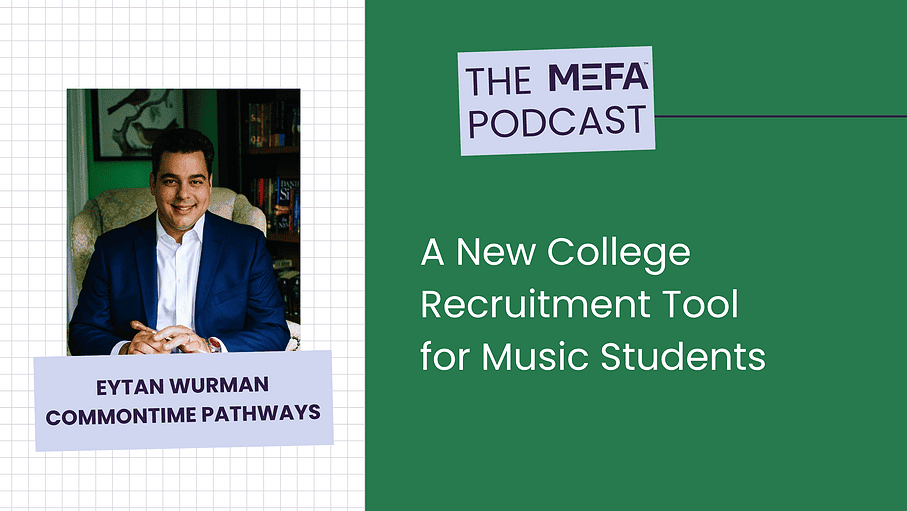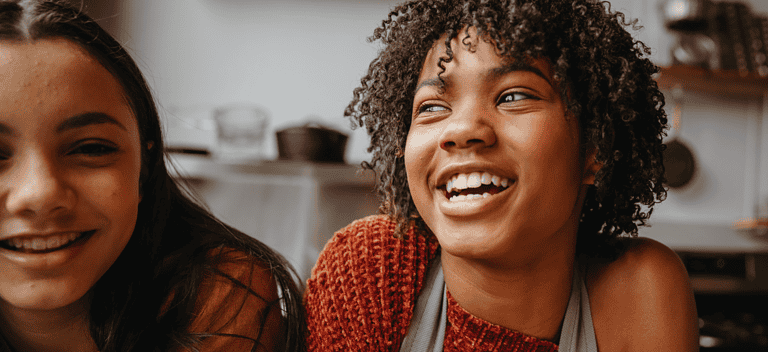Resources Mentioned in this Episode
Eytan Wurman: [00:00:00] And here’s the really beautiful thing is everyone thinks, oh if they don’t want to study music, they shouldn’t be getting a music scholarship. But I have to remind everybody that the football player doesn’t study football. Am it’s the most hilarious type of thing that I think we’ve done to ourselves is convince everyone that if you’re not good enough to go to Julliard, that you shouldn’t study music.
And that’s just not true. That’s like saying if you can’t get in to Notre Dame as a first string quarterback, you just shouldn’t play football. That’s not the kind of culture we want to create and not the kind of environment that we want to have.
Jonathan Hughes: Hi folks, and welcome to the MEFA Podcast. My name is Jonathan Hughes, and you just heard from our guest on the show today. His name is Aan Worman, and he was a music teacher who saw that matching student musicians with colleges and with scholarships was way too difficult, so he created common time pathways.
To help do just that. You can learn all about that in our [00:01:00] conversation as well as his thoughts on the cultural value of studying music, empathetic education, the various ways to make a living as a musician, and a lot more, he’s a deep thinker and very passionate on this subject. So if you’re a student musician or if you have a student musician in your family or in your life.
Who may be college bound soon. You wanna stick around and listen to this conversation. I will be back after the interview to wrap things up, but for now. Let’s meet our guest.
Eytan Wurman: My name is Eytan and I’m the CEO and founder of Comment Time Pathways, which we’ve effectively created to be a recruiting platform for musicians and giving them the opportunity to network with colleges and have access to recruiting and scholarships the same way that the athletes do.
So it’s a big thing. There’s. 5 million musicians that are in schools between eighth grade and senior year of high school, and a huge number of them will not continue music past the age of 18, and nobody really [00:02:00] talks about that. It’s a pretty big deal, and I think it’s important for our culture to start talking about music.
Differently, not just think of that as something nice that’s really good for the education and edification of a child, but thinking about specifically the value associated with culture bearers and what the culture bearer economy actually looks like in this country. And thinking about how colleges and student life and all of those things that matter to them really.
Make a difference with regards to music and music education and those music culture bearers. And I think that the that common time pathways is really the new way that we think everyone is going to start talking about music differently. And I think that’s really why we’re here.
Jonathan Hughes: Great. So we’re going to get into all of that, which I can’t wait to do.
Yeah. But tell everyone exactly. How this works and how students interact and just the big picture of common time.
Eytan Wurman: Yeah, so the really cool thing is that right now, the only way that colleges and students interact [00:03:00] is primarily through typical and old playbook recruiting channels, right? We’re talking about going to conferences, meeting them at all states, talking about going to summer camps, and going to be actually working with a professor that’s at a summer camp and they say, Hey, you should come and work.
You play in my studio the, my backup school, when I was applying to colleges, I won’t tell you how long ago, but when I was applying to colleges, my backup school was where I attended a summer music camp for three summers in a row because I felt comfortable there. I knew I could go there. I knew they would give me financial aid.
And so it was an awesome opportunity for me to end up applying and having an option. And I think that’s what this is all about. Like this is not just about getting the 1% of music kids recruited to the 1% top con conservatories in colleges in the country, in the world. This is about getting more musicians to be musical.
Generally and breaking down those access barriers. So students interact with colleges right now, very limitedly in a very limited fashion, [00:04:00] specifically as I mentioned, through conferences, Allstate, things like that. And then summer camps in particular. So the really cool thing is that we’re trying to widen the pipeline.
We’re trying to give access to colleges and networking to students who don’t make it to Allstate. What about the kids who can’t afford to go to summer camp? What about the kid who wants to go to space camp or computer science engineering camp? And can’t afford to do both and doesn’t have the time to do both.
But that kid is desperate to be musical when they go to college and there’s a financial benefit and a scholarship that can be associated with that. I think there’s a huge potential here. To change the way that colleges interact with students because right now it’s extremely limited. It’s extremely expensive and it’s really, prohibitive.
And we’ve done that to ourselves. We’ve choked off the pipeline over the last 100 years and I think that music colleges now are really starting to figure out new ways. To connect with kids that are not just those Allstate kids talking to first generation kids. Kids who have parents who say, I’m [00:05:00] never going to pay for you to get a music degree.
That was my dad. So I think this is a big deal, is making sure that we can reach those kids because 98%. Of musicians do not study music in any way, shape, or form, and beyond that I it, a humongous number of them simply leave the music at home when they leave their parents’ house.
Jonathan Hughes: You provided a really useful, I think, analogy with student athletes, right?
So a student athlete could go and post video of him or herself, to the NCAA and colleges would have access to that and be able to see that and know, and they, of course the analogy here is they want to go and play for that college’s team, or the college wants them to come and play for their team, for the musician.
What is the parallel with the team? They, you mentioned a conservatory, is that right? And so is this for-
Eytan Wurman: It’s everything. And here’s the really beautiful thing is everyone thinks, oh if they don’t want to study music, they shouldn’t be getting a music [00:06:00] scholarship. But I have to remind everybody that the football player doesn’t study football.
And that’s the most hilarious type of thing that I think we’ve done to ourselves is convince everyone that if you’re not good enough to go to Julliard, that you shouldn’t study music. And that’s just not true. That’s like saying if you can’t get in to Notre Dame as a first string quarterback, you just shouldn’t play football.
That’s not the kind of culture we want to create and not the kind of environment that we want to have. And so the really beautiful thing about the athletics comparison is, like you said, guidance counselors around the world. Are really wonderfully and appreciatively talking about things like NCSA and MAX Preps and all of these platforms that exist like Huddl, where you can sign up as a student and post your video.
Or in max prep’s situation, you don’t even have to sign up. Your coach literally lists your name in a roster and then puts up all of your stats and shows, video of your materials and everything, and then people can follow you. You [00:07:00] can get, you can be followed as a 15-year-old athlete. With people just watching your games and watching your performances, and that is where the college coaches know to go and look.
So if a college coach wants to find a great lacrosse player, they go to Max Preps and NCSA and huddle in all of these places and see where are these kids located? Where are they physically? Can I reach them? Can I communicate with the family? That doesn’t exist in the music world because we guard student data in the music world very carefully, which we should.
We absolutely should be very careful with student data, but in the same way that student athletic information is posted and made publicly available. Not necessarily to everyone in the whole wide world. Everyone has their database protected, but in the end, the college coaches know where to go so that they can funnel that clearing house type of thing, and then actually make direct connections with the families and with the schools.
This doesn’t exist in the music world, and that’s why we’re trying to create it. [00:08:00] The idea of a professor of clarinet trying to find somebody. In the middle of Texas when they, their college is in Baltimore. Nobody knows how to do that. The same thing happens when you’re not just a music major looking person.
Perhaps you are, Florida State and you are fielding a 420 person marching band. That’s an incredible organization that is comprised of both majors and non-majors. There are engineering majors and psychology majors and future lawyers and doctors in that marching band. And I think that universities as a whole have lots of opportunities for students to participate in non-majors on ensembles, which means the kid in the third row of clarinet.
Who, the clarinet section, who’s never going to go to Allstate. That kid doesn’t practice nearly enough to go to Allstate. That doesn’t mean they’re not worthy of a college scholarship. The idea is that even if you’re not a high achieving clarinetist or a high achieving violinist, or the most incredible vocalist that got the lead in the high school musical this [00:09:00] year.
You still deserve a scholarship, and I think that’s really where all of this opens up. The idea is that you are creating value for a university by being an artist, the same way that athletes create value for a university by being an athlete. So there is monetary value that is already associated with it, and there are actually.
Most of the colleges out there that are not advertising their scholarship dollars, they can’t, and they can’t do it the same way that the athletics programs can’t do it. So the athletes have this whole situation where they can be reached out to, and the scholarship money hasn’t been advertised at all.
It’s just reserved on the side, and it’s expected that the university goes and gets the student to assign the scholarship to. No one can put up a billboard on the highway saying, we’ve got money available who’s a musician? That’s not how this works. You have to network directly with the college network, with the band director, network, with the orchestra director, network with the choir and jazz directors.
At which point, if they like you and you like them, the money [00:10:00] exists and can be assigned to you before you even apply the same way it does for the sports kids. So how does a student then. Use comment, time pathway. So it works in much the same way as a Max Preps or an NCSA. You come in and you post your information, you tag yourself in a video, you put up a YouTube link, and you create your data.
You add how far are you willing to go away from home? What is your financial aid need how big is the school that you want to go to? What other programs does it need to have? For example, are you looking for a computer science degree? While at the same time you’re an incredible cellist. And then we have the biggest proprietary database, which automatically filters the thousands of colleges in the country and shows you, which has both what you’re looking for, and then presorts them based on your test scores and your expected, admissions data.
What is your target school? What is your reach school? What is your safety school? So there’s a hundred hours of searching on Google [00:11:00] that you don’t have to do anymore, and it’s all free for an applicant. And so that’s really beautiful. What’s beautiful about this. And then from there they can either directly register and connect with and message with professors and colleges and admissions directors.
Or just in the same way that the sports folks do it, those admissions directors and recruiters and professors can log in and find you. And so they post their video, they post what they play, they post what their academic goals are. They post what their scores are, they post whether they’ve been in Allstate or nationals or regionals or whatever kind of performance things happen.
And then you give your little musician statement, they can all come in and they can all filter and see everything that’s up there, and they can really go in and then directly invite you to come and meet them.
Jonathan Hughes: How did you come up with this and what was your, I’m guessing this is born out of your own experience. Can you tell us a little bit about what that was?
Eytan Wurman: Most of my team are music teachers, and I was a music teacher for 12 years in [00:12:00] Massachusetts, and I got angry at the fact that they were handing out athletic scholarships like it was candy. And I don’t mean that the athletes don’t deserve it, I just mean it seemed comparison.
It was insanely difficult to connect a musician with a viable scholarship. So what was the steps that, what were the steps that you took to, to create the service? So Startup Life is, I is all about craziness, experimentation, agility, and listening to customers. We thought originally we were trying to create a completely different platform and what we found by talking to the colleges was that it was.
Near impossible to really filter the list of students out there and get a real qualified lead in front of you in any way, shape or form besides going to a summer camp. That’s the really hard part because that is an enormously expensive and time consuming barrier for 90% of the kids who are musicians in this world.
It’s the same thing like telling [00:13:00] you’ll never get an a sports scholarship if you don’t pay $10,000 in the summer to go to a shooting camp. That’s just not how it works. And so we tried to talk with them and see what worked and how it could work and what’s this looking and how is this. I talked to probably over 150 colleges and people in professorships and different music teachers and guidance counselors out there, and we discovered.
All of these different pieces that existed in the economy and in the environment on how to recruit and how to collect information about students safely and securely, and eventually came up with this model, which is effectively a social media dating app. It’s pretty much a dating app. This is the funniest thing to say.
It’s a dating app for young musicians and what college they might want to go to. And here’s the really beautiful thing is everyone thinks well. They need to prove that to the world. The applicants need to prove to the world that they are worthy of going to an institution. But now the narrative is [00:14:00] shifting, which is the institutions are also having to prove themselves as worthy of receiving an applicant.
And so everyone’s going to have to get more competitive. Colleges are going to have to come up with better ways to do recruiting and more targeted and specific recruiting and music in particular has not been able to. Modernize. I know that’s shocking to hear. Especially in the classical music world. They have not been able to modernize their techniques and their systems in alignment with everything else that’s going on in the recruiting world.
And so I think this is something that’s not only we’ve thought about very thought, very in a lot of detail and gotten a lot of people to give us feedback. And we’ve been super agile and experimenting with different things and features and products and tools within the product.
And then I think. The platform itself has gone through probably 500 transformations in the last year alone. Sometimes twice a day will shift gears completely and just make sure that we’re hitting as much value as possible for the colleges, while at the same [00:15:00] time staying true to our mission, which is making sure that the students have access to those colleges in a way that treats the student like the thing and the person and the individual with skills and value that needs to be shopped for by the university.
And so when was the launch? Oh if you’re a musician, this is a fun little pun here. Minimum Viable product was released on four-four, and if you’re a musician, common time Pathways, common time being four, four time signature. I had to make a dad joke out of the whole thing. But, it just is what I is, and it was a good time.
Anyway I think the really important thing to remember was that no one is ever ready to launch a product. It’s incredibly difficult to know what minimum, in terms of minimum viable product means for a startup person and for an entrepreneur and for my founding team. Ultimately it’s really complicated to know at what point can you really throw something up there and not be afraid of failure.
That’s really hard [00:16:00] because this has not existed. We are two months old. When, you and I met at the end of March. It was one week before we’d even publicly launched the platform and allowed anyone to register for it. And so this is awesome. It’s brand new. We’ve already got several hundred kids online and we’ve got 25 colleges.
Actually this week I we’re recording this the week of June 9th in 2025 and June 9th, 10, 11, and 12. You’re, if you log into CTpathways.com, you’ll see we have something called Recruit a Palooza. Which is a really exciting opportunity for kids to go to a recruiting festival type of fair where we have 25 colleges making more than 40 or 50 events online and the kids can literally register and the in the colleges can invite people if they want to meet specific folks and communicate with them through the platform.
And then it’s just all online hangouts. Hey, come learn about [00:17:00] Florida State’s music program. Hey, come learn about. Temple University, Hey, come learn about Syracuse. All of these kinds of schools are just trying to see how we get going with this. And right now it looks like we have more than 75% of our events are going to be fairly well attended, which looks really great.
And here’s actually the really nice part because it’s online, they don’t need to stand at a college fair booth for eight hours hoping someone will come and talk to them. If, let’s say there is that moment when they schedule a meeting, let’s say, the New England Conservatory schedules a meeting for 10:00 AM.
And kids are still in school and the parents can’t get out of work to go meet with them, and nobody registers for that one event. NEC can make the decision to say, Hey, that wasn’t a well-timed event. Let’s just reschedule it. And they can then not waste their time. They don’t have to sit there and wonder if anyone’s going to show up.
It’s all pre-registered, prearranged and confirmed, and it’s just a really great, valuable use of their time.[00:18:00]
Oh yeah, so assumptions are the way we live our lives. I assume that I can afford this more. Mortgage. Therefore, I will, I assume that I can get into this college. Therefore I will. I assume that I would be a good fit for this job. Therefore, I’ll apply for it. And the assumptions that we make about ourselves tend to be extremely limiting.
And so the power of assumptions typically has a hold on us, and we’re not very ready to release those assumptions until we are guided intrinsically in many ways, very carefully and very subtly to think. Differently. Sometimes there will be a proverbial frying pan to the head that will say, my God, why didn’t I realize I could do that?
[00:19:00] And yes, that happens, but more often than not, a good leading question from a guidance counselor or a teacher can change the entire trajectory of a child’s life. And so I think that the. The powerful assumption that music is not a value proposition to a university, but simply a value to a student’s educational growth and personal development is an enormous assumption.
And the guide, excuse me, the guiding questions that we need to be asking are. You have dedicated this much of your life to being a musician for the last four years, 10 years, 15 years, however long they’ve been playing an instrument and or singing. Excuse me. And I think the really valuable thing to guide students into realizing and their families even more is that there is a billion and a half dollar economy in between being Taylor Swift and living in your parents’ basement until you’re 45.
So that’s just an [00:20:00] example. Of an assumption that exists, especially in the music field, which is that you’re either going to be broke or famous and there are tens of thousands, if not hundreds of thousands of professional musicians who have houses. And mortgages, and some of them send their kids to private schools and some of them have a three car garage and some of them live the dream and have a $3 million mansion in a nice town that we all eventually think about having as an American dream, and they do it.
As a professional musician, and it’s not just those who play for the top five orchestras, and it’s not just those who make it and do a Super Bowl halftime show, which by the way, they’re not paid for, which is hilarious, but that’s not this podcast. I think that there’s an enormous assumption that we make, of course, that musicians have a value to themselves and we undervalue the value that they give to a community and a [00:21:00] society in particular.
What is a university or college environment and a university and college environment lives off of student life and empathetic education in a community building sense that I think music is enormously central to fostering. And I think that’s where the guiding questions will start to change the way that we assume the value of a musician lives and sits.
I think that there needs to be a shift, and the guiding questions that I try to ask are quite simply, why do we value an athlete differently? Not better, not worse than we do a musician. What is empathetic education? I. I think that this is a really interesting topic and we could probably do an entire 45 minute discussion just on empathy and education.
I think that the role of the self in an education is [00:22:00] something that has always been really well established. The idea that your test scores are individual. The idea that your essays are written by you, yourself, the ever hated. Presence of group projects. See what I mean? I think individualism and hyper individualism.
Are a result of the way that we’ve trained education to be a dog eat dog type of competitive environment. While at the same time we’ve also hyper individualized all of our social interactions through social media. The idea that people cannot get away from their social media. Cannot get away from their devices yet, even within that community, there is no community.
It’s simply yourself versus every other person on social media in trying to grab attention. And so I think there’s a way to develop community and the [00:23:00] need for community within a person. And I think that music is critical to the way that community is created. There are very few things that create community that are not sports, arts, music, performance, and eventually politics.
But please don’t ask me about those, and I think that’s what’s important. What makes the us? Is it a belief? Is it our art? Is it our music? Is it our politics? Is it our economy? What is it that makes us American? What is it that makes the French? The French? What is it that makes the Germans?
The Germans? What is it makes the Japanese. The Japanese and the Chinese. The Chinese, it’s their cultural heritage, which is primarily through their art, their music. Their history, their community, and that is what shared culture ultimately results in, is this empathetic understanding within that culture of we are a belonging within this [00:24:00] community that creates our sense of self.
And I think back to your point about empathetic education, the goal is not just to understand ourselves, but the idea is that until we understand ourselves and how we live within our community. We cannot learn about those in other communities and how our interactions with those people can grow our sense of self and grow our sense of community.
Jonathan Hughes: So I want to close with two questions about the value of music education. The first one being very literal value of it, right? You mentioned that you can make money in music. It doesn’t necessarily mean. That if you’re pursuing a music career, that you’re either going to be rich or broke. Can you just talk about some of the ways that folks do that?
Eytan Wurman: There are more than 20 different tracks for education that allow. A musician to find [00:25:00] themselves in an economy that allows them ultimately to make a living beyond being a professional musician, performing, you can be a professional. You can be a professional music administrator, business music business administrator.
You can be a teacher, you can be a music therapist, you can be a a jazz performer and an opera singer. You can be a music technology specialist. You can be a sound engineer. You can be in any aspect of business, marketing and operations. You can be a music librarian. You can be any one of probably two or three dozen different things beyond just a performer.
And I think that many musicians actually find themselves going not into an elite performance track because they realize that’s like going into music, assuming everyone’s [00:26:00] going to get into the NFL. And so I think that’s where this exists. The actual value of music allow me to explain, there are tens of thousands, if not, as I mentioned, hundreds of thousands of musicians in this country alone.
Who have perfectly solid incomes based on portfolio careers, whether it’s partially teaching, partially performing, partially administering, partially helping with marketing, attending. Not everyone has to be a YouTuber. Not everybody has to be a superstar, right? And that’s the really beautiful thing for everyone that you see who is a superstar.
There are 10,000 people you don’t know about who live next door to you in your neighborhood who are professional musicians.
Jonathan Hughes: I’d love to hear your thoughts on. Why music continues to be vital culturally and what we lose by having, you said 98% of folks stop training or playing music when they go to college?[00:27:00]
Eytan Wurman: So you’re hitting on a very interesting point, which I think is at the right, right at the core. Why Common Time Pathways is so important when students who don’t have their parents hovering over them to make sure that they practice, go to a concert, attend a rehearsal, move to college, and realize that music becomes an independent part of their life. They are, and this has been documented, and I think we need I need to find the source for it for you, but I think it’s something along the lines of the number of students who are musical in one shape, way, shape, or form independently in college are 10 or 15 times more likely to be concert going, concert ticket buying audience members when they’re adults.[00:28:00]
And so we wonder why our art institutions and our symphony orchestras struggle to fill seats. And it’s because I think ultimately most of the people I see going to concerts are musicians in one way, shape, or form, that have decided to do something else. And that’s entirely valid. People who go and pay.
For New England Patriots subscription season tickets are kids probably who played football with their parents on the weekends, throwing a football around, playing tackle with their friends when their parents weren’t watching. People who buy Celtics tickets or New York Knicks tickets were pi, probably kids who played basketball as children.
The idea is that. The longer they continue to play into their adult independence, the more likely they are to continue to participate in it as at minimum a consumer [00:29:00] skyrockets. And I think that’s where this is incredibly important. We don’t want 98% of students to stop being musical on their own when they turn 18, 19, 20, and go off to college.
We want that number to stay enormous. Because the more culture bearers we have, the more cultural and vibrant our community, and I think we’ve already discussed how that builds into a stronger social community and a better empathetic education. Boy oh boy, is that a manifesto to die on?
Jonathan Hughes: So where can young musicians and anyone interested find Common Time pathways.
Eytan Wurman: Common time Pathways is at ctpathways.com is a great place to come check us out. We’re also on socials if you want to take a look at TikTok or Instagram. They’re at Common Time Pathways. You spell it all out one word, common time pathways, and you can always shoot us an email, give us a call.
We’d love to hear from everybody. Ultimately, the [00:30:00] goal is to have all 5 million of those musicians on the platform because God knows they need help just like everyone else paying for what are now astronomically high college costs.
Jonathan Hughes: Eytan, thank you so much for being here. I really enjoyed this conversation. I loved learning about what you do.
Eytan Wurman: Thanks. This is a ton of fun, and I’d be happy to come on anytime. Just shoot me a ring.
Jonathan Hughes: All right. Thank you so much, Eytan. I really enjoyed that and thank you for sharing your time and your passion with us. And folks, if you liked what you heard today and you want to hear more from us on planning, saving, and paying for college and career readiness, then you can follow the show and you can do that wherever you find your podcasts.
And please remember to review us. It helps us to keep doing what we’re doing in getting this show out in front of folks like you. I would like to thank Shaun Connolly, our producer. I’d [00:31:00] like to thank Lisa Rooney. Lauren Danz, Meredith Clement, AJ Yee, and Christina Davidson for their assistance in getting the show posted.
Once again, my name is Jonathan Hughes and this has been The MEFA Podcast. Thanks.















